'I've never met my team but have lunch with them weekly'
- Published

Randi Lippert says the virtual staff lunches have brought everyone together
When Randi Lippert moved to London from Canada for work she was looking forward to getting to know her new colleagues.
Unfortunately, she relocated just before the first coronavirus lockdown last year. "I didn't have much in-office time to bond with my new team members before we all had to work from home," says the 28-year-old.
Thankfully for Ms Lippert, she has been able to get to know all her new workmates over lunch - "Zoom lunch" that is.
Her employer, investment firm Wealthsimple, pays for lunchboxes to be delivered to staff at their homes across London, and encourages everyone to eat them while socialising with colleagues virtually over video conference calls.
Ms Lippert says she joins in at least once a week, and that the experience has been a help during a challenging period.
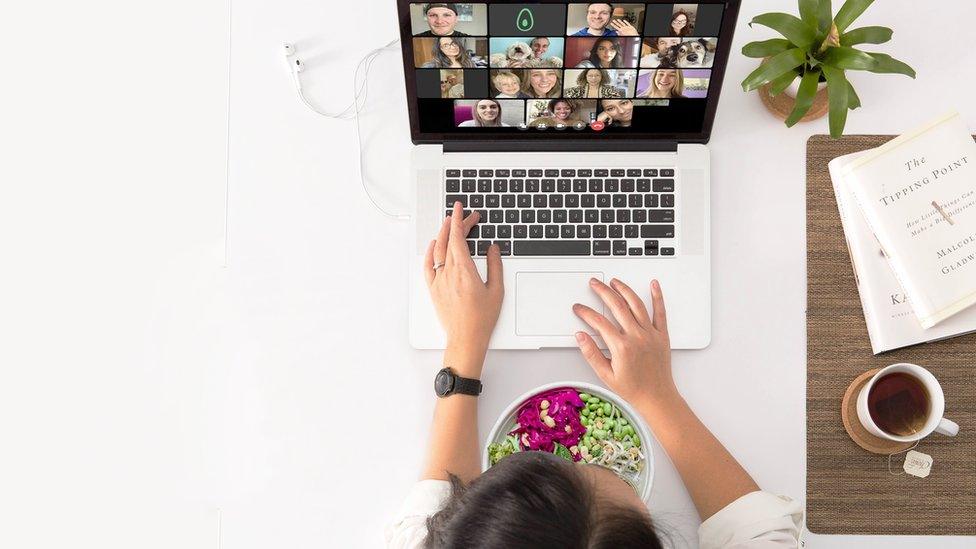
Do you "Zoom lunch" with workmates?
"Remote lunches have been an amazing way to have dedicated time and space to socialise with my colleagues," she says. "It has truly cultivated a sense of camaraderie and support during what has been an extremely weird and often isolating time."
Food has traditionally been a fundamental part of our working days, presenting an opportunity to take time away from the desk or production line, and socialise with colleagues. You could go to the staff canteen, or perhaps to a local cafe, pub or restaurant - to talk shop, have a gossip, or perhaps deliberately chat about anything but work.
But with a third of UK workers now working from home again , externalin the latest lockdowns, the work lunch as we know it has changed dramatically over the past year.
Even making a cup of tea in the office kitchen presents a potential health hazard these days. And with many of us staying at home, work canteens have been closed, and town and city centre food outlets have shut up shop and axed staff.
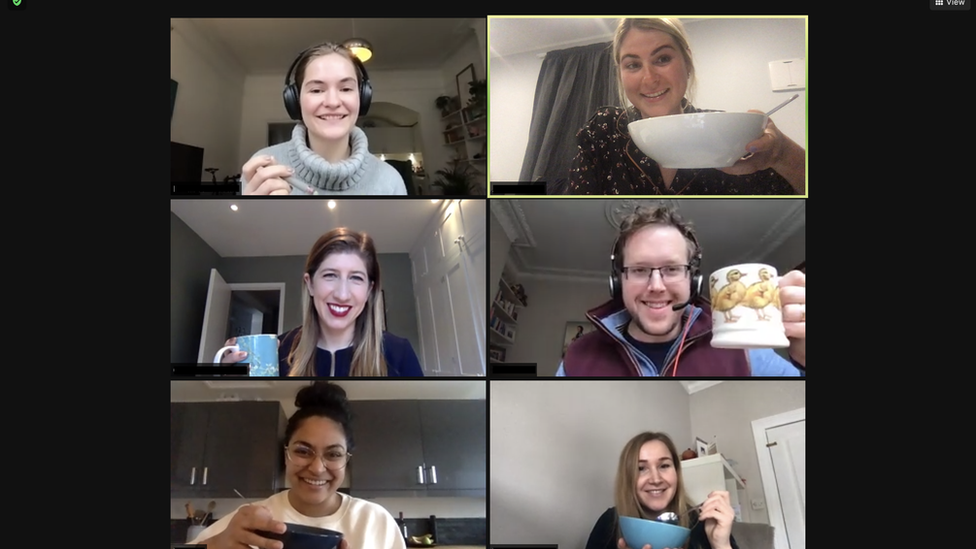
Randi Lippert has a "Zoom lunch" with colleagues, pictured here, at least once a week
While companies like Wealthsimple are encouraging home-working staff to have virtual lunches together, others see the provision of decent food as key to getting staff to enthusiastically return to the office once restrictions are lifted.
Advertising agency Havas London, which continued to serve employees subsidised hot and cold food when they were allowed back into the workplace after the first lockdown, is one such firm. "Part of our jobs running the business is to create workspaces people love to be in," says chief executive Xavier Rees. "And I think food is a really important part of that."
In addition to the quality of food it offers, it has protected workers by putting Perspex around the food service areas, creating a one-way system, and pulling tables further apart.
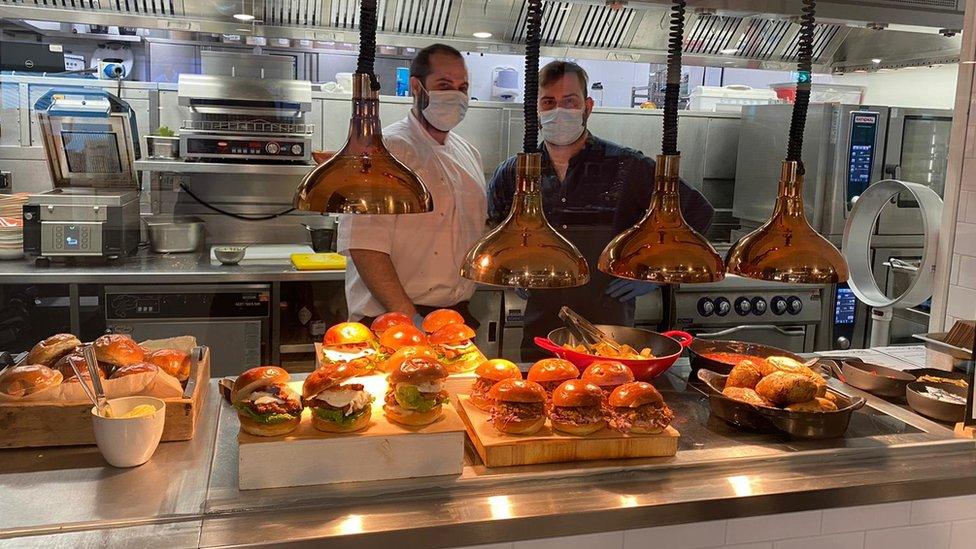
Havas London hopes that the quality of food on offer in the staff canteen will tempt staff back to the office
Other companies are offering more pre-packaged food options, boxed lunches, and vending machines that operate via touch-free technology.
Contactless tea and coffee machines, where you can choose the drink you want by hovering your hand over the machine's selection panel, are set to be a common feature in the workplace in the future, according to Andrew Jones, head of essentials at vending machine distributor Express Vending.
"Manufacturers have been working to develop more Covid-safe ways of interacting with these machines," he says. "Every piece of equipment will now have some form of technology."
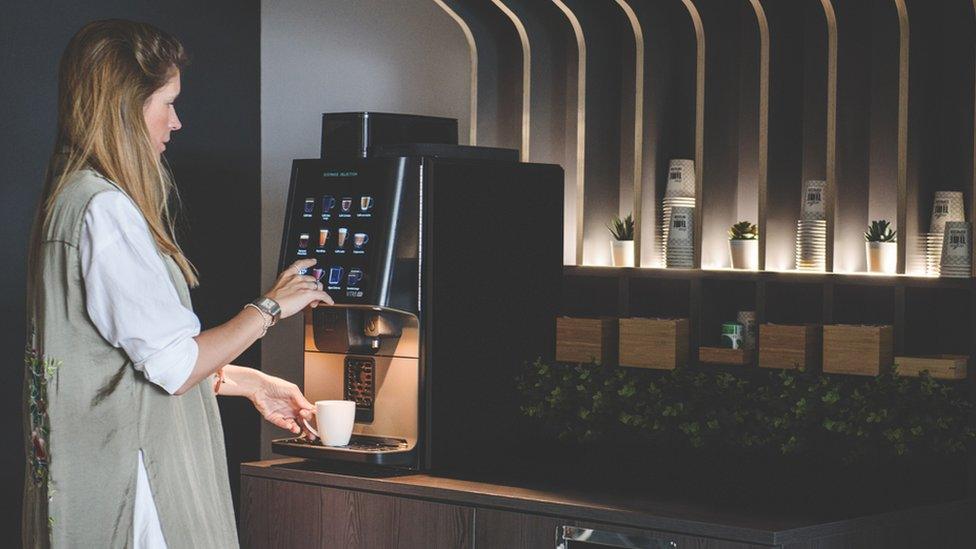
This coffee machine does not have buttons, instead you hover your hand over the selection panel
Meanwhile, at Huckletree, a co-working space with premises in Manchester, London and Dublin, co-founder Gabriela Hersham says that members appreciate the food provided on site.
"If they don't need to go into a Pret, or a high footfall shop, they feel more comfortable getting their coffees from us."


New Economy is a new series exploring how businesses, trade, economies and working life are changing fast.

Jane Sparrow is founder of management consultancy The Culture Builders, which helps firms to make their offices a more enjoyable place for people to work. She says that ensuring staff have access to a decent lunch helps build a strong company culture.
"A lot of sharing and connecting tends to happen over food, because it creates a less formal atmosphere," adds Ms Sparrow. "So when leaders are looking to engage with people, or connect, we often say 'do it over a meal'."
One firm helping businesses to improve the food they offer staff for lunch is Feedr, a London-based food-tech firm that allows companies and employees to order food from local restaurants, and have it delivered to their workplace via an app.
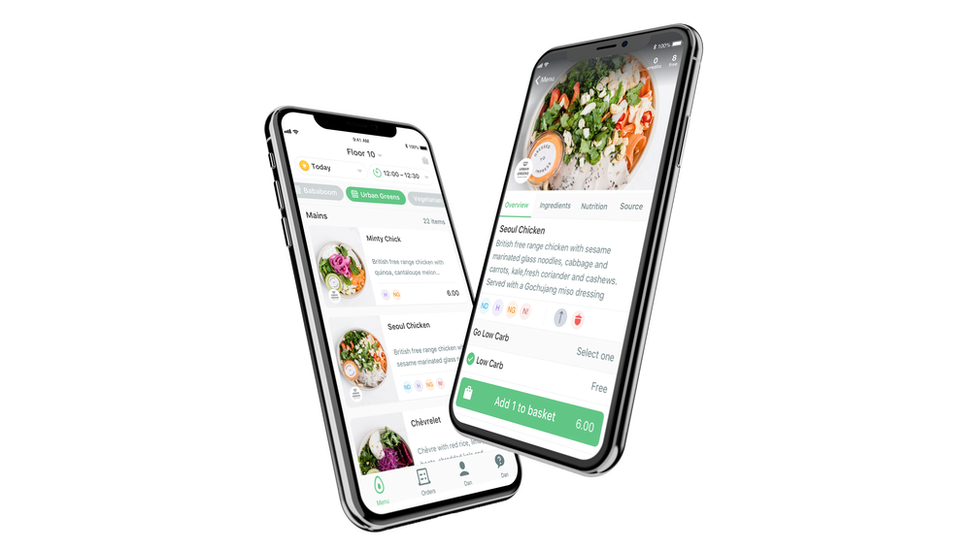
The Feedr app connects companies with local restaurants
Founder and chief executive Riya Grover says the pandemic has spurred companies to embrace technology that gives people easier access to food at work, and helps prevent food waste. "It works well in environments where you have fluctuating headcounts on site," she says.
At the end of last year Feedr also introduced its new service that allows firms to send lunches to employees' homes - Wealthsimple uses their service.
Nutritionist Laura Clark says that all businesses need to start reminding staff to take a lunch hour, whether they are in the office or working from home.
"Some businesses have been proactive, and making sure it's transparent that everybody across the organisation is taking a break, getting some fresh air, and having the opportunity to have a lunch away from the keyboard," she says.
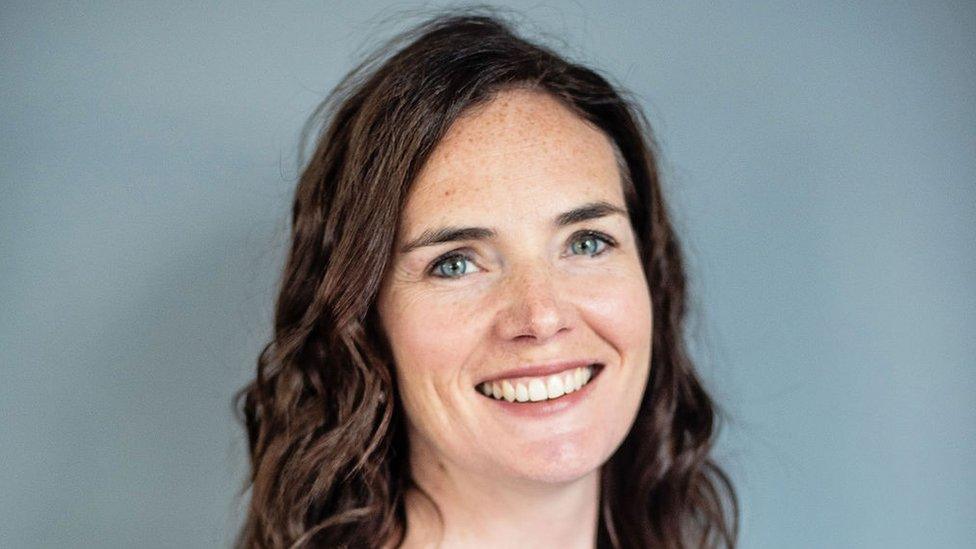
Laura Clark says that home workers may be eating better than they did in the office
Ms Clark adds that the benefit to people working from home is that it may mean they are adopting a more diverse diet.
"We are all quite predictable in the food choices we make within a working week," she says. "Many of our decision-making processes become automatic, and default towards the same chicken sandwich, from the same shop we walk past everyday.
"So it's an opportunity for people to take a step back, and think 'now I have access to all of this food in the kitchen'."
Business psychologist Stuart Duff, of firm Pearn Kandola, agrees that having video lunches with colleagues can be very beneficial for home workers.
"As most of our interactions are now in formal video conference meetings, we miss having opportunities for the fun, 'spontaneous' conversations with each other," he says.
"Having a social lunchtime increases opportunities for spontaneous conversations, which in turn builds and maintains trust between colleagues."
Wealthsimple's UK community manager Abby Capper says that home-working staff enjoy the Zoom lunches, and that she also organises breakfasts.
"Everyone loves getting on a call, and not talking about work," she says. "It encourages people to take a break. As people have been working from home the hours merge into one."